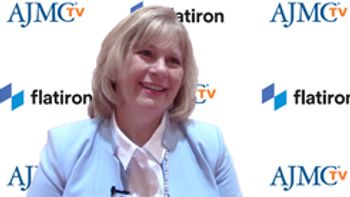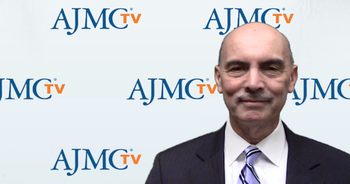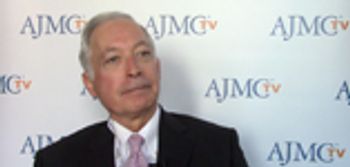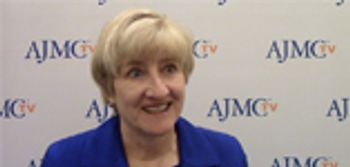
There are 2 categories of challenges facing oncology practices as they transition to value-based payment models, said Aaron Lyss, director of value-based care for Tennessee Oncology.

There are 2 categories of challenges facing oncology practices as they transition to value-based payment models, said Aaron Lyss, director of value-based care for Tennessee Oncology.

Despite the politics involved in healthcare, it seems unlikely that the industry to going to stop its migration toward more accountability for quality, said Michael Kolodziej, MD, national medical director of managed care strategy at Flatiron Health.

As the healthcare industry moves more toward value-based payments, practices have a real need for data that is usable and can help them succeed in new payment models, Kim Woofter, executive vice president of strategic alliances and practice innovation at the Advanced Centers for Cancer Care, explained at OncoCloud '17, held by Flatiron Health September 16-17 in Las Vegas, Nevada.

CMS has issued an informal request for information seeking input on a new direction promoting patient-centered care and market-driven reforms for the CMS Innovation Center.

A recent survey conducted by Integra Connect has found that a majority of specialty physicians have not yet invested in operational changes that may be essential for their success under value-based care reimbursement models.

There are 3 different areas of healthcare that all face different challenges in implementing population health and adopting new reimbursement models, explained Peter Aran, MD, medical director of Population Health Management at Blue Cross Blue Shield of Oklahoma.


Every week, The American Journal of Managed Care® recaps the top managed care news of the week, and you can now listen to it on our podcast, Managed Care Cast.

This week, the top managed care articles included a report from the Congressional Budget Office on the impact of eliminating the cost-sharing reduction payments; a decision from CMS to eliminate 2 mandatory bundled payment programs; and a new value-based alliance that called for ending use of a test for diagnosing heart attacks.

There is a lot of evolution happening in healthcare in a number of areas, including policy, technology, and the market, explained Deanne Kasim, founding partner of Santesys Solutions.

This meeting presents unique perspectives on emerging topics in managed care from today’s leading experts

At the 2017 American Society of Clinical Oncology Annual Meeting, oncologists heard from fellow experts on the best way to navigate the daunting challenge of payment reform.

The survey found a jump in physician burnout since 2013 and a gap in the commitment to combat medical errors, a problem that persists despite the movement toward quality measures.

Public and private payment reforms such as accountable care organization contracts have shown some initial evidence of changes in physician behavior, but their full promise remains to be seen, according to Zirui Song, MD, PhD, resident at Massachusetts General Hospital.

Incentives must be aligned between payers and providers to transition to value-based care and physicians must have the best access to information to make the right decisions in these value-based arrangements, explains L. Patrick James, MD, chief clinical officer for health plans and policy, medical affairs, for Quest Diagnostics

Although the country is moving toward value-based payments, for providers it’s basically still a fee-for-service world, said Charles J. Fazio, MD, MS, of HealthPartners Health Plan, at America’s Health Insurance Plans’ Institute & Expo, held June 9-10 in Austin, Texas.

The collaboration between Innovative Oncology Business Solutions and the American Society of Clinical Oncology on the COME HOME Model should help give community oncology practices a path forward to be competitive, said Barbara McAneny, MD, chief medical officer of New Mexico Oncology Hematology Consultants.

Reactions to the $8 billion amendment introduced by Rep. Fred Upton (R-MI) that helped seek Republican support for the American Health Care Act in the Senate.

This week in managed care, the top stories included a surprising shake-up in leadership at Molina Healthcare; feedback for the Oncology Care Model; and Healthy Vision Month is focusing on women.

By identifying ways to improve cancer care and then designing alternative payment models (APMs) to overcome current payment barriers, APMs can enable oncology practices to deliver better care to patients and save money for payers in a way that is financially sustainable for the practices.

While the Merit-based Incentive Payment System (MIPS) has gone into effect for physicians that participate in Medicare Part B, many questions remain about the practicalities of the program. Physicians could also participate in advanced alternative payment models (APMs), but the vast majority of physicians and physician groups are expected to participate in MIPS.

Private sector accountable care organization development has been motivated by perceived opportunities to improve quality, efficiency, and population health, and the belief that payment reform is inevitable.

On May 4-5, 2017, The American Journal of Managed Care's ACO & Emerging Healthcare Delivery Coalition will head back to Scottsdale, Arizona, to bring together stakeholders from across the industry.

The roundtable provides a forum for academic researchers, health policy experts, patient advocates, health insurance plans, and the pharmaceutical industry to debate on the most sustainable strategies for patient cost sharing for medications.

At the 2nd cost-sharing roundtable hosted by the Patient Access Network Foundation and The American Journal of Managed Care®, Tricia Neuman of the Kaiser Family Foundation provided a perspective on what the future might hold for patients enrolled in Medicare.

259 Prospect Plains Rd, Bldg H
Cranbury, NJ 08512
© 2025 MJH Life Sciences®
All rights reserved.
